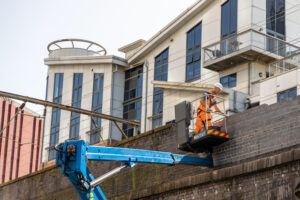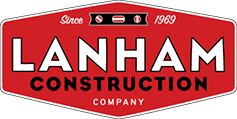
The biggest threat to well-made masonry isn’t the simple passing of time, as you might think; it is actually moisture.
Masonry is one of the sturdiest and most long-lasting building methods, but even this steadfast favorite cannot last forever. After all, nothing does. The biggest threat to well-made masonry isn’t the simple passing of time, as you might think; it is actually moisture. And since most masonry is installed for outdoor use, moisture is a fact of life. So how can you protect the investment you’ve made in sturdy, dependable masonry work? By understanding how moisture can pose such a big risk and learning to mitigate the potential damage.
Masonry Naturally Absorbs Moisture
The material that your bricks are made from, such as clay or concrete, is likely to be naturally porous. This means that it allows water to seep in. Any water, including rain, leaks from pipes, and even runoff can be absorbed by the material of the bricks. Once the water seeps in, that is when the damage starts. Any time that water seeps in or sits in the material, it will start doing damage. Over time, the water can wear away the bricks and mortar, especially if the original installation wasn’t done correctly (one of the primary reasons not to DIY masonry jobs), or possibly even seep through the walls and into your basement or crawlspace, causing additional damage if it is not waterproofed.
When Water Gets Under Concrete
Water is also a threat under masonry, such as concrete slabs for your walkways or patio. When water flows under masonry, it can wash away the underlying dirt and gravel. If it saturates the soil under the concrete it can also start to pool and create an unsafe situation, as the water wears away and weakens the concrete while also loosening the soil that needs to be fairly compacted.
The Freeze-Thaw Cycle
During winters in this area, water poses the most extreme risk. When water seeps into porous bricks or into cracks in concrete and sits in the winter, it will freeze there if it is cold enough. When water freezes, it expands. The pressure of this expanding water is enough to force cracks to widen and do significant damage to bricks. Once it thaws and runs back out, the cracks are now larger, and end up allowing in even more water to do even more damage.
Protecting Masonry
The best way to protect your masonry is with periodic inspections that catch damage early and repair it before it becomes a huge problem. There may also be materials that you can apply to the surface of your masonry that can repel or block the water, but you should have a professional come out and inspect and repair any damage before applying anything.
Lanham Construction For All Your Construction Needs
Lanham Construction is an award-winning and dependable construction company dedicated to serving your home or business with whichever construction project you have in mind. Our professional team is eager to serve customers throughout Maryland, Virginia, and Washington D.C. When you pick Lanham, you won’t ever have to worry about the process. We’re here to help every step of the way.
For more information on how we can help, visit our website or give us a call at 301-459-7545!
